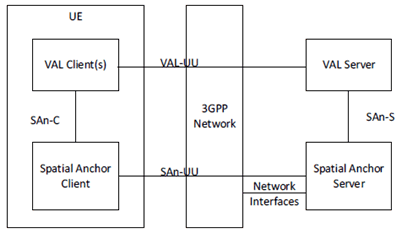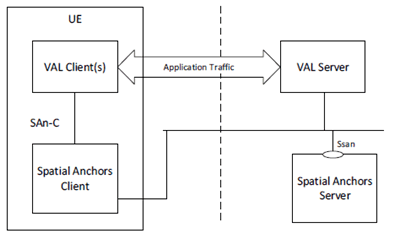Content for TS 23.437 Word version: 19.0.0
8 Spatial Anchors (SAn) Server
8.1 General
8.2 Functional model for spatial anchors server
8.2.1 General
8.2.2 On-network functional model description
8.2.2.1 Functional Elements
8.2.2.2 Reference Points
8.2.3 Service based architecture
...
...
8 Spatial Anchors (SAn) Server p. 14
8.1 General p. 14
Spatial anchors server is a SEAL service that offers spatial anchors related capabilities to one or more vertical applications.
8.2 Functional model for spatial anchors server p. 15
8.2.1 General p. 15
This clause provides architecture for spatial anchors (SAn) service. The on-network functional model is specified in clause 8.2.2, and service based architecture is specified in clause 8.2.3.
8.2.2 On-network functional model description p. 15
Figure 8.2.2-1 illustrates an on-network functional model for Spatial Anchors (SAn) service.

The Spatial Anchors server functional entities are grouped into the vertical application layer and the Service Enabler Architecture Layer (SEAL) layer. The Spatial Anchors server offers the capabilities to manage spatial anchors to the vertical application layer. The Spatial Anchors server functional model is based on SEAL layer as specified in TS 23.434.
The spatial anchors server functional entities on the UE and in the network are respectively the spatial anchors (SAn) client and spatial anchors (SAn) server. The VAL client and VAL server are application client and server respectively to provide an application service to the user. The SAn client and SAn server provides client and server side functionalities respectively for managing spatial anchors for the application. The SAn client is a SEAL client providing spatial anchors service to VAL client. The SAn server is a SEAL server providing spatial anchors service to VAL server and UE. The interface between SAn Client and SAn Server is SAn-UU. The SAn client interacts with the VAL client using a SAn-C interface. The SAn server interacts with the VAL server using a SAn-S. The SAn server communicates with the underlying 3GPP network system (either directly or via NEF) using network interfaces specified by the 3GPP network system (e.g. T8, N33). When SAn server is deployed by PLMN operator, the SAn server communicates with 3GPP network system by directly invoking the APIs from exposed by 3GPP core network functions.

Figure 8.2.2-2: Spatial Anchors server interaction with Spatial Map Server
(⇒ copy of original 3GPP image)
(⇒ copy of original 3GPP image)
Figure 8.2.2-2 illustrates the functional model for interconnection between SAn server and Spatial Map server.
8.2.2.1 Functional Elements p. 16
8.2.2.1.1 Spatial anchors (SAn) server p. 16
The SAn server acts as a SEAL client and it is used to provide services to create/update/delete/discover spatial anchors for the VAL application (i.e. metaverse application). It can communicate with other SAn server in the distributed SEAL deployments.
8.2.2.1.2 Spatial anchors (SAn) client p. 16
The SAn client acts as a SEAL client for spatial anchors server. It supports client side functionalities for creating/updating/deleting/discovering/retrieving spatial anchors for VAL application (i.e. metaverse application). The SAn client receives the request from VAL client to perform specific functionality.
8.2.2.1.3 VAL server p. 16
The VAL server is specified in clause 6.4.2.3 of TS 23.434. The VAL server provides the server side functionalities corresponding to the vertical applications (i.e. metaverse applications) to the client of a VAL user based on a service contract.
8.2.2.1.4 VAL client p. 16
The VAL client is specified in clause 6.4.2.2 of TS 23.434. The VAL client provides a metaverse services to the user. It uses the SAn client to manage spatial anchors for the application.
8.2.2.2 Reference Points p. 16
8.2.2.2.1 SAn-UU p. 16
SAn-UU reference point enables interactions between a SAn client and SAn server. It is used to create/update/delete/discover/retrieve spatial anchors for the VAL applications (i.e. metaverse applications).
8.2.2.2.2 SAn-S p. 16
SAn-S reference point enables interactions between a SAn server and VAL servers (i.e. metaverse application servers). It can be used to create/update/delete/get/retrieve spatial anchors for the VAL applications (i.e. metaverse applications).
8.2.2.2.3 SAn-C p. 16
SAn-C reference point enables interactions between a SAn client and VAL clients (i.e. metaverse application clients). It is used by the VAL client to share information regarding spatial anchors related information to the SAn client and also to get spatial anchors related information from the SAn client.
8.2.2.2.4 SEAL-X (AnM) (between the SAn server and the SM server) p. 16
The SEAL-X (AnM) reference point, which exists between the Spatial anchors server and the Spatial map server, provides a means for the both servers to exchange information related to anchors and maps to each other.
8.2.3 Service based architecture p. 16
Figure 8.2.3-1 illustrates the service-based SEAL architecture to support spatial anchors services.

Figure 8.2.3-1: service based architecture for spatial anchors server
(⇒ copy of original 3GPP image)
(⇒ copy of original 3GPP image)
The SAn server exposes the APIs over the SSAn interface to the VAL server and SAn client. The VAL servers consume the services by interacting on the SSAn interface of the SAn server. The CAPIF can be used by VAL functions to discover the services of the SAn server.